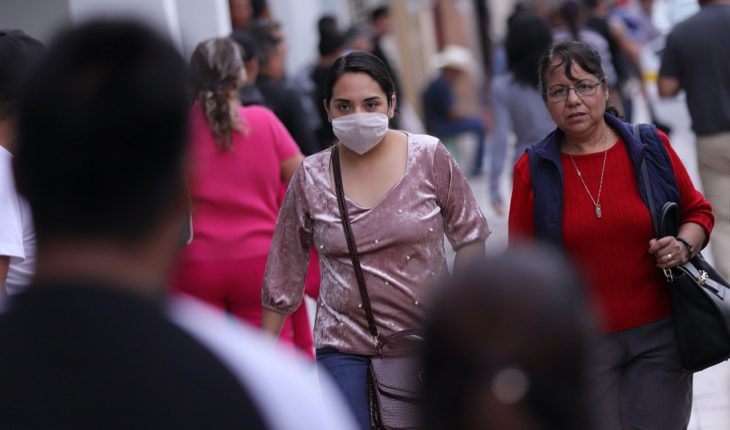Rocío García was already concerned about the difficulties that the health emergency entails in the care of her son Diego, with autism spectrum disorder, when she became infected without knowing how coVID-19.
Now she has to be isolated inside her home so as not to expose her family— who tested negative, but she still is in charge of stewing her so that someone else will feed her.
“I started with breathing problems, extreme exhaustion, bone pain like rheumatism and a continuous headache. I have only four days producing phlegm, but with a sense of a horrible taste,” he recounts in an interview with Animal Politics through text messages, as he lacks the air to speak.
Find out: Government warns of violence against women in confinement but curbs resources from shelters
Although she was not in direct contact with people who have traveled, she used public transport and was at the crowded women’s march on March 8 in Mexico City. She contacted the health authorities, who asked her to answer a questionnaire to assess the possibility that she was infected and she was considered a candidate, because she also suffers from chronic diseases: purple and diabetes. She was asked to go into isolation from that point on, where staff from the National Institute of Respiratory Diseases (INER) were going to her home to examine her.
The next day, they came to check for oxygenation, lungs, temperature, heart rate, blood pressure and to do a pharyngeal exudate test, with which a day later they confirmed the COVID-19 infection. The “good news” was that it is only carrier and not transmitting, so it was not advisable to enter a hospital, unless it became complicated.
But he’s had trouble breathing. A pneumologist asked her to go directly to INER on Friday, but she did not want to, for fear that she would be admitted and would have to leave Diego in charge of her sister.
He spends most of the day confined to his room, although he can walk around his house, avoiding physical contact and using head covers all the time; it has its personal fret and washes them separately, as well as disinfecting the objects you use.
The doctors paid her nothing, but she had to pay for the medicines she, fortunately, considers cheap: acetaminophen and salbutamol, which cost her 120 pesos.
With these measures, you can’t meet your child’s needs, who doesn’t roast on his own when he goes to the bathroom, doesn’t know how to brush his teeth, he needs support for tasks like buckling the hole and putting on some clothes, and lately requires more supervision because he’s been given to get out on the street.
People with autism are characterized by needing daily routines, so breaking up what they’re used to involves stress and difficulty caring.
Rocío has not worked since his 14-year-old son was diagnosed with third-grade autism, the most severe, so that he could devote himself full-time to him, because when he had a job the child could not go to school. Her other 17-year-old daughter has become the one who takes care of them both now that she is ill, and her husband, who has not stopped leaving home to go to work, supports when she arrives at night.
At least Rocío has this family network and a couple’s income, but many women like her face a single to care for a dependent relative, most without formal work to be able to engage in these tasks, and therefore will hardly have income during the social estrangement measures dictated by the Government to the pandemic by the new coronavirus.
Support for families, just a help
There are at least 7 million people with disabilities in Mexico and virtually all have some degree of dependence on the lack of necessary infrastructure, and the National Population Council (Conapo) estimates that in total there are more than 40 million people who need some form of care, including young children and older adults.
Unpaid work in households, if paid, would represent 23.5% of Gross Domestic Product (GDP), 5.5 trillion pesos, where what women did would be 2.6 more than men, according to the National Institute of Statistics and Geography (INEGI). A third of that is only care for dependents.
Rocío has the income of the program of Mexico City “My scholarship to start”, of 400 pesos per month, and the Pension for Persons with Permanent Disabilities launched by the current federal government, of 2 thousand 620 pesos per bimonth. On the occasion of the contingency, this program advanced one of the payments to the 800 thousand enrolled that there are, although it is not extra money.
In order to support those with children with disabilities, the association “Apapache A: Support for Parents with Children in Autism Spectrum AC” receives donations to buy pantries from these families in account 0118045980201 of BanBajío. Anyone who wants more information or their tax-deductible receipt can write to [email protected] or 55-1227-2685.
Margarita Garfias, a disability rights activist and mother of a teenager with epilepsy, says there is widespread concern that she is already triggering mental health problems because of the extra stress that women in situations like hers are subjected to.
For starters, he says, because since most have informal jobs, quarantine is leaving them without income to get what their children require. A few days ago, for example, he talked to a mother he no longer had to pay for the shipment of probes her daughter needs.
Another serious concern for which it calls the State is that by prioritizing care for COVID-19 patients, health services leave those with other conditions or need specialized treatments second. He knows the case of a child who is being delayed by studies, and another who suffers from repeat pneumonia and was receiving immune treatment, but was now told that he would be suspended while the emergency is being treated.
“They’re putting him more at risk. It is horrible that suddenly all the authorities turn to see COVID-19 and leave the chronically ill to their fate. And this is going to sharpen because without medical follow-up, there are setbacks, it increases disability and with it care,” he lamented.
“Then they are very strong things that not only hit you economically, physically, but also mentally and emotionally. It is a more unequal burden that women face. Crises are like a magnifying glass, which suddenly lets you see how rotten the system is and how lonely people, mostly women, care for are.”
International recommendations
Garfia belongs to the Yo Cuido Latin America movement, composed of organizations of and for caregivers, people with disabilities and chronic diseases, which issued a pronouncement to ask governments throughout the region to guarantee the rights of these people against the pandemic of the COVID-19 coronavirus.
Care work cannot continue to feminize, when those of us who exercise it DO NOT HAVE RIGHTS as well as those we care for: people with disabilities, and chronic diseases #YoCuido #YoMeQuedoEnCasa #Coronavirus #Covid_19 @M_OlgaSCordero @lopezobrador_ @nadgasman pic.twitter.com/bRBPXPwva9
— #YoCuidoMéxico (@yocuidomexico) March 25, 2020
“If the state does not act respponsibly, all the burden and consequences of this crisis will fall on our bodies, times and families. This will perpetuate the feminization, exploitation, informality, and inequalities involved in domestic and care work. Unjustly we are the ones who always stay at home to do the care work that sustains our societies and economies,” he said.
It called, in economic terms, for immediate monetary support to reduce the risk of people with disabilities and their families falling into poverty or greater vulnerability.
In social protection, recognition of the condition of dependence and likelihood of sickness of the caregiver and his caregiver, since their health and life can be seen at risk “in case of hospital collapses, where medical teams will prioritize those who have no therapeutic limitation as a result of their basic diagnosis”. In addition, ensuring access to basic inputs for those who require dependency care.
In terms of work, they called for measures to reduce working hours and flexibility of schedules for those they care for, as well as more children’s stays or day houses and a true school inclusion for people who require special attention.
And in health, immediate universal vaccination against influenza and measles, and continuity and quality of care to those with chronic conditions and disability. In the medium term, they called for the aim of providing health benefits to caregivers, as well as training and specialization to those who do this work without remuneration.
UN Women in Mexico also issued a series of recommendations, on the basis of recognizing that women do on average 39 hours of unpaid work per week and men only 14, according to data from the Inegi and the National Institute of Women (Women).
In addition to the State taking gender-sensitive action, it suggested to workplaces send a message that the extra domestic workload arising from contingency is recognized, so they would not ask their workers for the impossible. Establish a list of staff with these responsibilities and ask that by area look for ways to deliver urgent tasks and allow those people to devote themselves to the care needed by their family.
Within households, UN Women recommended co-responsibility and better sharing of tasks, washing fret, preparing food, cleaning housing and caring for peopleto prevent work from being carried out on women, who are the ones who tend to do so.
What we do in Animal Político requires professional journalists, teamwork, dialogue with readers and something very important: independence. You can help us keep going. Be part of the team.
Subscribe to Animal Político, receive benefits and support free journalism #YoSoyAnimal.





